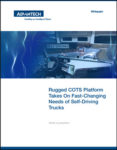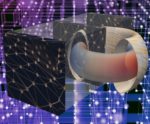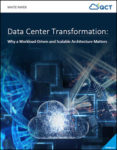This white paper by Advantech, “Rugged COTS Platform Takes On Fast-Changing Needs of Self-Driving Trucks” discusses how the fast-changing needs of self-driving trucks are forcing compute platforms to evolve. Advantech and Crystal Group are teaming up to power that evolution based on AV trends, compute requirements, and a rugged COTS philosophy converging for breakthrough innovation in self-driving truck designs.
Rugged COTS Platform Takes On Fast-Changing Needs of Self-Driving Trucks
Scientists Look to Exascale and Deep Learning for Developing Sustainable Fusion Energy
Scientists from Princeton Plasma Physics Laboratory are leading an Aurora ESP project that will leverage AI, deep learning, and exascale computing power to advance fusion energy research. “With a suite of the world’s most powerful path-to-exascale supercomputing resources at their disposal, William Tang and colleagues are developing models of disruption mitigation systems (DMS) to increase warning times and work toward eliminating major interruption of fusion reactions in the production of sustainable clean energy.”
GPCNeT or GPCNoT?
In this special guest feature, Gilad Shainer from Mellanox Technologies writes that the new GPCNeT benchmark is actually a measure of relative performance under load rather than a measure of absolute performance. “When it comes to evaluating high-performance computing systems or interconnects, there are much better benchmarks available for use. Moreover, the ability to benchmark real workloads is obviously a better approach for determining system or interconnect performance and capabilities. The drawbacks of GPCNeT benchmarks can be much more than its benefits.”
Video: Data Parallel Deep Learning
Huihuo Zheng from Argonne National Laboratory gave this talk at ATPESC 2019. “The Argonne Training Program on Extreme-Scale Computing (ATPESC) provides intensive, two weeks of training on the key skills, approaches, and tools to design, implement, and execute computational science and engineering applications on current high-end computing systems and the leadership-class computing systems of the future.”
Podcast: Spell startup looks to bring AI to the people
In this AI Podcast, Serkan Piantino from Spell describes how his company is making machine learning easier. “We want to empower and transform the global workforce by making deep learning and artificial intelligence accessible to everyone. We believe that as organizations and individuals can harness the power of machine learning, our world will change quickly. Our mission is to make sure the technology driving this change is not mysterious and locked away but open and available for everyone.”
Deep Learning State of the Art in 2020
Lex Fridman gave this talk as part of the MIT Deep Learning series. “This lecture is on the most recent research and developments in deep learning, and hopes for 2020. This is not intended to be a list of SOTA benchmark results, but rather a set of highlights of machine learning and AI innovations and progress in academia, industry, and society in general.”
How Deep Learning is Driving New Science
In this special guest feature, Robert Roe from Scientific Computing World looks at the development of deep learning and its impact on scientific applications. “In general, it depends on the use case but you can think of two cases where AI is useful. The first case is to solve problems that are hard to solve in a rule-based way, which is a similar domain as you may have outside science for speech recognition or image recognition.”
Optimizing in a Heterogeneous World is (Algorithms x Devices)
In this guest article, our friends at Intel discuss how CPUs prove better for some important Deep Learning. Here’s why, and keep your GPUs handy! Heterogeneous computing ushers in a world where we must consider permutations of algorithms and devices to find the best platform solution. No single device will win all the time, so we need to constantly assess our choices and assumptions.
Data Center Transformation: Why a Workload-Driven and Scalable Architecture Matters
In this whitepaper QCT (Quanta Cloud Technology) highlights Data Center Transformation: Why a Workload-Driven and Scalable Architecture Matters. The company is offering its QCT Platform on Demand (QCT POD) solution that empowers enterprises to kickstart their transformation journey. It combines advanced technology with a unique user experience to help enterprises reach better performance and gain more insights. With flexibility and scalability, QCT POD enables enterprises to address a broader range of HPC, Deep Learning, and Data Analytic demands that fulfill various applications.
Progress and Challenges for the Use of Deep Learning to Improve Weather Forecasts
Peter Dueben from ECMWF gave this talk at the UK HPC Conference. “I will present recent studies that use deep learning to learn the equations of motion of the atmosphere, to emulate model components of weather forecast models and to enhance usability of weather forecasts. I will then talk about the main challenges for the application of deep learning in cutting-edge weather forecasts and suggest approaches to improve usability in the future.”













